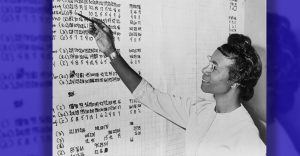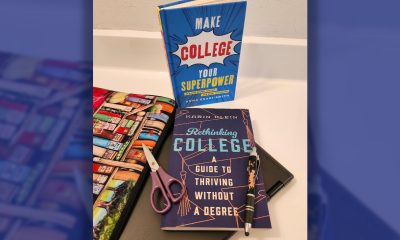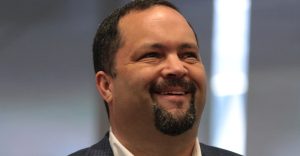Business
Push for Facial Recognition Privacy Standards Hits Roadblock
ANNE FLAHERTY, Associated Press
WASHINGTON (AP) — Retailers have the ability to scan your face digitally, and use that identification to offer you special prices or even recognize you as a prior shoplifter. But should they use it? Should they get your permission first?
Privacy advocates announced Tuesday they have walked away from a government-run effort with industry intended to answer these questions. The idea behind the negotiations was to hash out voluntary protocols for facial recognition technology in a way that doesn’t hurt consumers. The Commerce Department’s National Telecommunications and Information Administration, or NTIA, was acting as mediator.
The two sides had been meeting for 16 months, including last week, until the nine major privacy groups said they had hit a dead end and that “people deserve more protection than they are likely to get in this forum.”
“At a base minimum, people should be able to walk down a public street without fear that companies they’ve never heard of are tracking their every movement — and identifying them by name — using facial recognition technology,” the groups said. “Unfortunately, we have been unable to obtain agreement even with that basic, specific premise.”
Industry groups said they still believe consensus could be found on issues like transparency, notification and data security.
“We all want the same outcome — to help users be comfortable using online services with confidence that their privacy will be protected,” said Carl Szabo, policy counsel for an e-commerce trade group with Google and Facebook among its members. “Some of us have different opinions about what that outcome looks like.”
Microsoft said in a statement that it supports the idea that consumers have to agree to be recognized with biometric software before it can be used.
An NTIA spokeswoman said the government believed that progress had been made and the work will continue. “The process is the strongest when all interested parties participate and are willing to engage on all issues,” said NTIA’s Juliana Gruenwald.
The debate on facial recognition is only likely to grow bigger in coming years as it becomes more ubiquitous. Facebook, for example, has long used facial recognition technology on its site, and just announced a new companion mobile app called “Moments” that scans a phone’s camera roll to ease photo sharing. Microsoft says it is building facial-recognition and fingerprint-identification technology into Windows 10, the new computer operating system coming this summer.
The biggest concern, however, among privacy groups is use of the technology by retailers, including casinos, to target and profile people. One company, FaceFirst, announced last year that its system is capable of processing more than 1 million facial matches per second per server, making it ideal for these customers. So long as a company has an existing photo of “persons of interest,” from shoplifters to “your best customers,” retail staff can be sent an email or text alerting them of that person’s arrival.
The ability to apply a unique signature to a person’s face, even if you don’t identify them by name, is particularly invasive, according to privacy advocates. They argue that industry has little incentive to adopt tough standards and that Congress should pass general privacy legislation that applies to different technologies.
“You can change your password and your credit card number; you cannot change your fingerprints or the precise dimensions of your face,” the privacy groups said in Tuesday’s statement. “Through facial recognition, these immutable, physical facts can be used to identify you, remotely and in secret, without any recourse.”
Groups that signed the letter included the Center for Democracy and Technology, the Center for Digital Democracy, Consumer Federation of America, Common Sense Media, Electronic Frontier Foundation, American Civil Liberties Union, Consumer Action, Consumer Watchdog and the Center on Privacy & Technology at Georgetown University Law Center.
Copyright 2015 The Associated Press. All rights reserved. This material may not be published, broadcast, rewritten or redistributed.
Alameda County
Seth Curry Makes Impressive Debut with the Golden State Warriors
Seth looked comfortable in his new uniform, seamlessly fitting into the Warriors’ offensive and defensive system. He finished the night with an impressive 14 points, becoming one of the team’s top scorers for the game. Seth’s points came in a variety of ways – floaters, spot-up three-pointers, mid-range jumpers, and a handful of aggressive drives that kept the Oklahoma City Thunder defense on its heels.

By Y’Anad Burrell
Tuesday night was anything but ordinary for fans in San Francisco as Seth Curry made his highly anticipated debut as a new member of the Golden State Warriors. Seth didn’t disappoint, delivering a performance that not only showcased his scoring ability but also demonstrated his added value to the team.
At 35, the 12-year NBA veteran on Monday signed a contract to play with the Warriors for the rest of the season.
Seth looked comfortable in his new uniform, seamlessly fitting into the Warriors’ offensive and defensive system. He finished the night with an impressive 14 points, becoming one of the team’s top scorers for the game. Seth’s points came in a variety of ways – floaters, spot-up three-pointers, mid-range jumpers, and a handful of aggressive drives that kept the Oklahoma City Thunder defense on its heels.
One of the most memorable moments of the evening came before Seth even scored his first points. As he checked into the game, the Chase Center erupted into applause, with fans rising to their feet to give the newest Warrior a standing ovation.
The crowd’s reaction was a testament not only to Seth’s reputation as a sharpshooter but also to the excitement he brings to the Warriors. It was clear that fans quickly embraced Seth as one of their own, eager to see what he could bring to the team’s championship aspirations.
Warriors’ superstar Steph Curry – Seth’s brother – did not play due to an injury. One could only imagine what it would be like if the Curry brothers were on the court together. Magic in the making.
Seth’s debut proved to be a turning point for the Warriors. Not only did he contribute on the scoreboard, but he also brought a sense of confidence and composure to the floor.
While their loss last night, OKC 124 – GSW 112, Seth’s impact was a game-changer and there’s more yet to come. Beyond statistics, it was clear that Seth’s presence elevated the team’s performance, giving the Warriors a new force as they look to make a deep playoff run.
Activism
Oakland Post: Week of November 26 – December 2, 2025
The printed Weekly Edition of the Oakland Post: Week of November 26 – December 2, 2025

To enlarge your view of this issue, use the slider, magnifying glass icon or full page icon in the lower right corner of the browser window.
Activism
Oakland Post: Week of November 19 – 25, 2025
The printed Weekly Edition of the Oakland Post: Week of November 19 – 25, 2025

To enlarge your view of this issue, use the slider, magnifying glass icon or full page icon in the lower right corner of the browser window.
-

 Activism4 weeks ago
Activism4 weeks agoOakland Post: Week of November 12 – 18, 2025
-

 Activism3 weeks ago
Activism3 weeks agoIN MEMORIAM: William ‘Bill’ Patterson, 94
-

 Activism4 weeks ago
Activism4 weeks agoHow Charles R. Drew University Navigated More Than $20 Million in Fed Cuts – Still Prioritizing Students and Community Health
-

 Bay Area4 weeks ago
Bay Area4 weeks agoNo Justice in the Justice System
-

 #NNPA BlackPress3 weeks ago
#NNPA BlackPress3 weeks agoLewis Hamilton set to start LAST in Saturday Night’s Las Vegas Grand Prix
-

 #NNPA BlackPress2 weeks ago
#NNPA BlackPress2 weeks agoBeyoncé and Jay-Z make rare public appearance with Lewis Hamilton at Las Vegas Grand Prix
-

 Activism2 weeks ago
Activism2 weeks agoOakland Post: Week of November 19 – 25, 2025
-

 #NNPA BlackPress4 weeks ago
#NNPA BlackPress4 weeks agoThe Perfumed Hand of Hypocrisy: Trump Hosted Former Terror Suspect While America Condemns a Muslim Mayor






















































